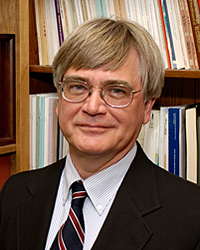Feature Story
Health Center Today, May 4, 2011
Scientists Find Gene Linked to Alcohol Consumption
By Colin Poitras

Victor Hesselbrock, professor of psychiatry at the UConn Health Center.
Photo by Peter Morenus
Researchers have found a gene that appears to play a role in regulating how much alcohol people drink, a discovery that could lead to a better understanding of drinking behaviors that can lead to alcoholism.
Victor Hesselbrock, interim chairman of the Department of Psychiatry at the University of Connecticut School of Medicine and director of the Alcohol Research Center at the UConn Health Center, was one of about 100 scientists worldwide involved in the three-year research project that combined data from five different large-scale genetic studies. The findings were recently published in the Proceedings of the National Academy of Sciences, one of the world’s most-cited multidisciplinary scientific journals.
The scientists identified a gene known as ‘autism susceptibility candidate 2’ or AUTS2 that appears to influence levels of alcohol consumption. The gene has previously been linked to autism and attention deficit hyperactivity disorder, but its function remains unknown.
In a study of more than 47,000 people worldwide, the researchers found two versions of the AUTS2 gene, one of them three times more common than the other. Individuals with the less common version of the gene drank on average five percent less alcohol than people with the more common version.
The gene is most active in parts of the brain associated with neuropsychological reward mechanisms, suggesting that it might play a part in regulating the positive reinforcement that people feel when they drink alcohol.
Identifying the gene and figuring out how it functions could lead to more effective interventions for alcoholism and for people with drinking problems, such as those who engage in binge drinking.
“When we can understand the functionality of a gene, than perhaps we can intervene with more targeted pharmacological agents,” says Hesselbrock, who has dedicated most of his career to understanding the underlying behavioral mechanisms of alcohol consumption and dependence.
Hesselbrock was involved in the project because of his ongoing work with the Collaborative Study on the Genetics of Alcoholism (COGA). The study, which began in the U.S. in 1989, is one of the largest extended family studies in the world designed to identify genes that influence the vulnerability to alcoholism and related conditions.
Excessive alcohol consumption is one of the leading causes of preventable deaths in the United States. There are many reasons why people drink, but scientists have long hypothesized that both genetic and environmental influences are involved in the process. COGA has previously identified about 20 other genes that are associated with alcohol dependence, including several genes associated with alcohol metabolism.
The finding of an association between alcohol consumption and the autism AUTS2 gene is novel, in that this gene was first linked to a non-addictive early onset childhood disorder. These results suggest that some genes may contribute to a variety of poor outcomes, not just to a specific disorder.
Comprehensive Testing
The study was led by Professor Gunter Schumann from the Institute of Psychiatry, King’s College London, and Professor Paul Elliott from the School of Public Health at Imperial College London.
“The difference that this particular gene makes is only small, but by finding it we’ve opened up a new area of research into the biological mechanisms that control drinking,” Elliott said at the time the findings were released.
What makes the study particularly impressive, says Hesselbrock, is the comprehensive testing that supported the findings. Schumann not only identified the gene, he replicated the finding twice, first in a separate living sample and then in samples of brain tissue. He also did functional studies in mice models and fruit flies.
The researchers conducted a genomic scan of DNA samples from more than 26,000 volunteers to search for genes that appear to affect alcohol consumption; they then checked their findings in another 21,000 people. The volunteers reported via questionnaire how much alcohol they drank.
Once the researchers identified the AUTS2 gene, they examined how much messenger RNA – a copy of the gene’s code that is used to make a protein – was present in samples of donated human brain tissue. They found that people with the version of the gene associated with lower alcohol consumption produced more of the messenger RNA, meaning that the gene was more active. The researchers then took what they knew and investigated strains of mice that had been selectively bred according to how much alcohol they drank voluntarily. They found that there were differences in the AUTS2 gene activity levels among different breeds of mice that drink more or less alcohol.
Finally, the researchers found that blocking the effect of a related gene in fruit flies made the flies less sensitive to alcohol. The findings indicate that AUTS2 seems to be involved in the regulation of alcohol intake in a number of different species.
An Important First Step
“This is an important first step toward the development of individually targeted prevention and treatments for alcohol abuse and addiction,” said Schumann.
As exciting as the latest findings are, Hesselbrock cautions that alcoholism, like other behavioral disorders, is very complex genetically and much more work needs to be done.
“We know alcoholism and alcohol dependence most likely involve a constellation of genes. There could be 20 to 30 other genes involved,” Hesselbrock says. “This is an important piece, but it is not the whole story.”


